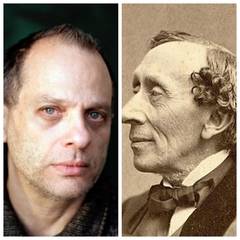|
Back
Poverty’s Poetry+ New York
Crypt, Church of the Intercession
12/08/2023 - & December 11, 12, 2023
David Lang: The Little Match Girl Passion
Ekmeles: Charlotte Mundy, Amber Evans (Sopranos), Tomás Cruz (Tenor), Steven Hrycelak (Bass)
Jeffrey Gavett (Conductor)

D. Lang/H. C. Andersen
“Guardian: We’re giving you a time machine: what period, or moment in musical history, would you travel to and why?
Lang: I would love to sing in the choir at Notre‑Dame cathedral, with Léonin and Pérotin, in Paris, at the start of the 13th century. Imagine being there at that moment, when all those sweaty monks in their scratchy wool robes started adding patterns and imitation to Gregorian chant. What were they thinking?”
David Lang
********************************************
“Where words fail, music speaks. When the bird of the heart begins to sing, too often will reason stop up her ears.”
Hans Christian Andersen
Pulitzer Prizes are usually tickets to oblivion. Not so David Lang’s Little Match Girl, which, since its 2008 award, has travelled the world, has been transmogrified into ballet and oratorio, drama and orchestra, has been performed a thousand-and-one times, including last night at the Church of the Intercession.
The reasons are both evident and esoteric.
Evident are the utterly gorgeous sounds issued by four voices and a minimum of percussion. Evident too is the Hans Christian Andersen story and the quotes from Saint Matthew Passion, a pairing of agony and fear, beauty and redemption. As performed last night by Ekmeles–four singers, a conductor and a pianissimo battery of bass drum, glockenspiel, sleigh bells and tubular bells–The Little Match Girl offered what Mr. Lang offered: an unearthly setting in a setting both ancient and timeless.
Yet more important are the esoteric secrets of this piece. Secrets which, after many hearings, slowly are made manifest. And a major enigma which, last night, was revealed to this listener as if by Revelation itself.
On first hearing, The Little Match Girl is both strange and quietly glorious. One easily hears the voices repeating after each other, the tones wrapping around each other. This with the near‑silent tintinnabulation of bells and bass drum banged slowly.
On second hearing, it is equally gorgeous, and now some of its musical arcana become know. Are these quiet bells the snowflakes which will comfort the child and send her to a peaceful death? Are these notes like the solitary motifs from Ars Antiqua hymns, starting as perhaps five notes, broken up, given to each singer, repeated endlessly as though an eternal orison?
Further hearings reveal more technical comprehension (for nobody can ever get enough of The Little Match Girl). Yet two facts are salient. First, that it never loses even a patina, a mote of its original utter beauty. Second, that one inevitably and helplessly tries to unravel its covert questions.
Last night–and for several more nights this weekend and next week–the “Death of Classical” production began a disclosure. First, because the Ekmeles ensemble never produced what the work wasn’t. They didn’t walk around, didn’t move. They stood in a straight line and allowed the purity of their voices and their unerringly clear enunciation do the work the justice it deserved.

Ekmeles at Church of the Intercession
(© Andrew Ousley/Death of Classical)
More revelatory was the setting in the 110‑year‑old Church of the Intercession. Notably the Gothic Arches over the entire Crypt. Each of these pointed arches rose from the walls in different styles. Some of the rises were uninterrupted, soaring and falling. Others started to rise and–like the growth of a pine tree–created its own arches, themselves soaring and falling.
One had no way of knowing how the architect took such a static art–yes, frozen music–and gave it an organic, always unexpected growth.
David Lang never either imitated older music or older words (though, like Bach’s Passion, or like Greek tragedy, it contained both the tale and its commentary). Yet by pairing the airy sailing the architecture, with the flights of the music, one began–began–to understand how such beauty came to be.
Haydn said creation came from “up there”. Lang implied that creation came from down on the earth. And that with Ekmeles and the Gothic setting, Little Match Girl rose last night as it presumably will for eons to come.
Harry Rolnick
|